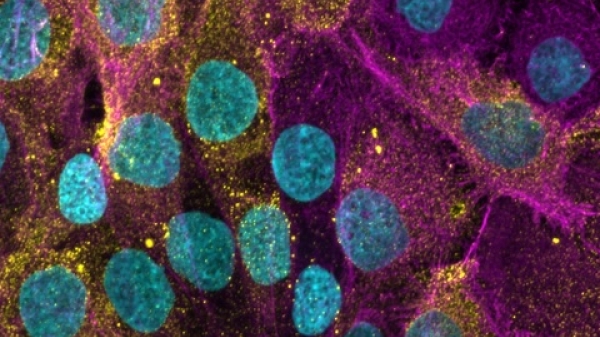ASU cancer research explained in creative ways

Professor of Practice Pauline Davies.
Could plants, fungi and animals provide information to scientists on preventing cancer in humans? It’s possible, according to researchers at ASU’s newly created Arizona Cancer and Evolution Center.
Established by an $8.5 million grant from the National Cancer Institute, the center will serve as a hub for research scientists dedicated to understanding cancer through an evolutionary and ecological lens. It will offer physicians and researchers new insights and tools for both studying and controlling cancer.
Parlaying those discoveries to public discourse will include outreach lead Pauline Davies, a professor of practice at the Hugh Downs School of Human Communication.
Davies, who helped write the grant proposal awarded to ASU, spent more than a decade as a science broadcaster for the BBC, as well as at its Australian counterpart, the ABC.
As outreach lead, Davies will promote training in interdisciplinary science, disseminate important research findings to the community, and engage the public in cancer systems biology research.
“Pauline Davies’ work exemplifies the importance of expertise in human communication in all aspects of our everyday lives,” said Linda Lederman, director and professor of the Hugh Downs School of Human Communication. “Her understanding of effective communication underlies her ability to design the outreach component which is crucial to this important scientific project.”
Davies and the Arizona Cancer and Evolution Center will collaborate with artists and musicians to help the public view cancer from new angles, with exhibits in museums and hospitals. A cactus garden next to the Biodesign Institute at ASU will also highlight how many organisms, including plants, can live with cancer.
“As part of our outreach efforts, we are working on developing a non-scary presentation on cancer to schoolchildren,” Davies said. “Children are very curious about science, and it’s entirely possible some may even become inspired to study science and enter the field of cancer research as well.”
Davies added that she feels privileged to be working with so many talented artists, scholars and researchers who want to help save lives through innovative means.
“It’s not only a great learning experience for me, but I also hope to inspire others to become involved as well.”
Find more information on the Arizona Cancer and Evolution Center.
More Health and medicine

First 2 degree offerings from ASU Health available in fall 2025
The first degree offerings from ASU Health will help students find jobs in the modernized health care system.The one-year…

ASU study uses new biomaterials for wound healing
A minor cut often heals within days, vanishing without a trace. Yet, wound healing and tissue repair are complex biological…

Moeur awardee seeks to turn passion into tangible human impact
Editor’s note: This story is part of a series of profiles of notable fall 2024 graduates.During high school, Nguyen Thien Ha Do,…